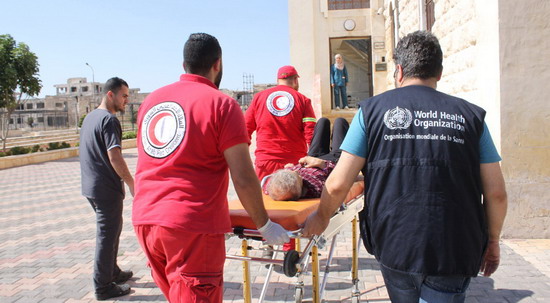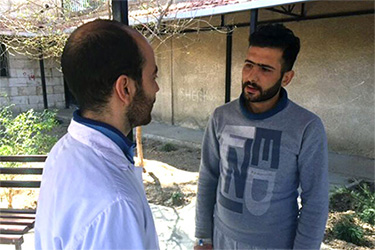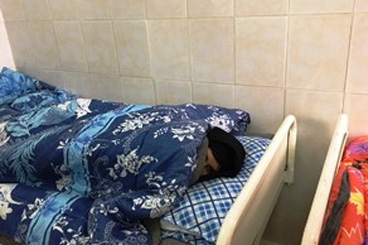WHO and its partners have decentralized mental health care and increased community-based approaches. For example, trained and supervised doctors and health workers are providing integrated mental health care in over 540 PHC centres across the country. Two psychiatric wards in Lattakia and Damascus provide management for mental, neurological and substance use disorders. In the northeast, through close coordination with health partners, WHO continued to transport patients in acute need of special care to Aleppo mental health hospital.
In 2019, health partners across the country were provided with 121 202 treatment courses of psychotropic medicines, and 552 316 MHPSS services were delivered, often through local NGOs and innovative community-based methods. WHO trained Reproductive, maternal, newborn and child health services are critically important in humanitarian settings, which typically see increases in maternal deaths, unintended pregnancies, sexually transmitted infections, unsafe abortions and GBV. In 2019, most governorates showed considerable progress in providing these services. In 2018, 32 hospitals across the country had neonatal resuscitation programmes; psychosocial workers throughout Syria (including the northwest) on Problem Management Plus, a low-intensity psychological intervention that tackles depression, anxiety, problem-solving skills and resilience for adults.
WHO’s office in Damascus supported training for 725 physicians on mhGAP. Hundreds of health care workers were trained on basic, family and group counselling, psychological first aid and first-line support for GBV survivors. The learn–work–learn method applied helped to ensure that learning was translated into practice and reinforced at further training sessions. Additionally, 26 journalists were trained on communications around suicide prevention and MHPSS.
In northwest Syria, WHO supported 45 health facilities with regular supplies of mental health medicines and covered the operational costs of the acute inpatient unit in Sarmada mental health centre, as well as four mental health mobile clinics and a 24-hour telephone helpline. With the support of the Turkey Humanitarian Fund and the United Nations Office for the Coordination of Humanitarian Affairs, in 2019, this number rose to 38. The number of patients referred to specialized hospitals almost doubled, from 2821 to 5437. There was a similar rise in the number of mothers and newborns benefiting from home care (from 6361 in 2018 to 12 358 in 2019). An estimated 15% of deliveries and 15% of newborns will continue to require life-saving emergency interventions in 2020.


MHPSS services were integrated into 42 PHC centres, 32 mobile clinics, 20 hospitals and eight specialized centres. Overall, approximately 280 psychosocial workers now work in 118 facilities in northwest Syria that provide MHPSS services. WHO trained 945 humanitarian and community health workers on psychological first aid, enabling them to provide immediate support to the newly displaced and refer them for MHPSS. In addition, 28 mh-GAP-trained doctors in Afrin underwent six months of training, field supervision and coaching.
Late in 2019, WHO took over six non-specialized MHPSS services in northern Syria from an international NGO whose future was threatened by insufficient funds. Today, all six facilities are continuing to provide quality MHPSS services.
The school mental health programme, which was launched in 2018, continued in 2019. Teachers, counsellors and social and community workers in schools and community centres were trained on how to detect, help and refer children suffering from mental health disorders. WHO also developed a mental health preparedness plan for interventions in emergencies in the northeast and the northwest.
Humanitarian agencies are increasingly concerned about the potentially damaging effects of stress on services and staff performance. In northwest Syria, WHO provided stress management through a training-of-trainers programme and training on selfcare, peer support and coaching for 328 aid workers.
The outcome of WHO’s capacity building was reflected in the improved effectiveness and performance of Syrian health and community care providers, clearly documented in MHPSS care outcomes for IDPs, returnees and host communities.
WHO strengthened advocacy and coordination efforts by chairing an MHPSS technical working group with partners and stakeholders within Syria. Work with the ministries of health and education, other UN agencies and national and international organizations led to several agreements and work plans to enhance universal coverage for mental health and combat stigma and discrimination.
WHO’s efforts to gradually integrate mental health into the health care system in Syria have demonstrated the feasibility of not only delivering, but also expanding, mental health services in the midst of a protracted crisis while simultaneously aiming to reduce stigma and discrimination against people with mental health problems.









